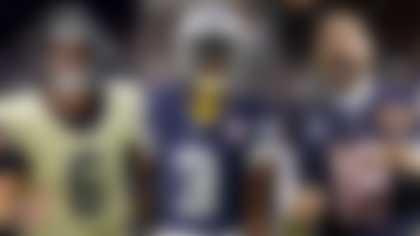In an era of ungodly passing numbers, dinking and dunking is, by 2021 NFL standards, a dirty phrase.
But should it be?
The New England Patriots have been conservative at the start of the Mac Jones era, relying heavily on a short but incredibly efficient passing attack. The rookie is completing 73.9 percent of his throws, which is sixth-best in the league among qualified passers. Jones hasn't thrown an interception and, if not for a Damien Harris fumble in the opener, he could easily have the Pats sitting atop the AFC East all alone with a 2-0 record.
"When you look at turnover statistics, the team that turns the ball over less usually wins," Jones said during a Monday appearance on WEEI's Merloni And Fauria Show. "I don't know what it is, but it's pretty high percentage-wise. We had less turnovers than the other team and (Sunday) we definitely could have capitalized more on the turnovers we got, but as long as you're ending every possession with a kick, then things will be moving in the right direction."
Sounds boring, right?
But that's a trait that's been ingrained in the 23-year-old for some time now.
"That's kind of what I have always been taught. There may be some things I can adjust and I will do that," Jones said, noting that he's taking his coaching and trying to "stick to your rules and throw to the open guy. It shouldn't be that confusing or complicated."
There has been debate locally about whether or not the Pats' offense can be successful if they continue to nickel and dime opponents. Per Next Gen Stats, Jones is averaging just 5.6 air yards per attempt, the fifth-lowest mark in the league. Jones also has been one of the most conservative quarterbacks in the league on throws of 10-plus air yards, with 15 attempts, 2.78 seconds average time to throw and 16.5 air yards per attempt (all bottom 10 in the NFL).
"Certainly you want to be able to attack all areas of the field and force the defense to defend everything," Patriots offensive coordinator Josh McDaniels said Tuesday. "We'll work hard to try to continue to do that. I know I can do more in that area to give us chances. I think there's also the balance of the timing of the game, the score, the situation, you're weighing risk or reward."
To further his point, McDaniels added, "There's an important balance between closing your eyes and heaving it deep when it's not there."
You could easily deduce that the lack of shots down the field may also be related to the Patriots and McDaniels doing their best to put Jones in more favorable situations. It would make sense, especially when you look at how some of the other rookie signal-callers are scuffling to start their career. The Pats saw that up close and personal on Sunday, intercepting the No. 2 pick, Zach Wilson, four times in a 25-6 win. But McDaniels says that's not how his offense is operating.
"I trust him completely," said McDaniels, noting factors that influence downfield passing such as protection and blitzes. "Believe me, there's not a whole lot we're holding back for him.
"You want to be able to test those areas of the field as we go forward, but I also want him to make smart decisions, I want him to protect the football, and I want him to be aggressive when there are times to be aggressive."
Jones has pushed the ball at times these first two weeks, a deep over to Nelson Agholor in Week 1, another to Jakobi Meyers that same game, a go route to Meyers on Sunday and a post that came on a free play after the Jets were flagged for being offsides. Only one, the over to Agholor, hit.
"I think it goes back to just me sticking to my rules and there's sometimes when the defense takes plays away and that's why we play," Jones said. "I mean, they are good on defense, too. At the same time, I feel like you take the three or four plays, or whatever it may be, whether it is in practice or a game, and you re-watch them and you're like 'OK, I probably could've thrown that one.'
"But, at the end of the day, it's about moving the ball and taking what the defense gives you. If they give you the deep shot, then take it. But if they give you the short, then take the short. It's kind of what the defense is doing, really."
Jones has proven to be a quick study, and as his super computer of a brain continues to learn and process information, the feeling is this is an area that won't still be under the microscope a month or two from now.
Follow Mike Giardi on Twitter.












